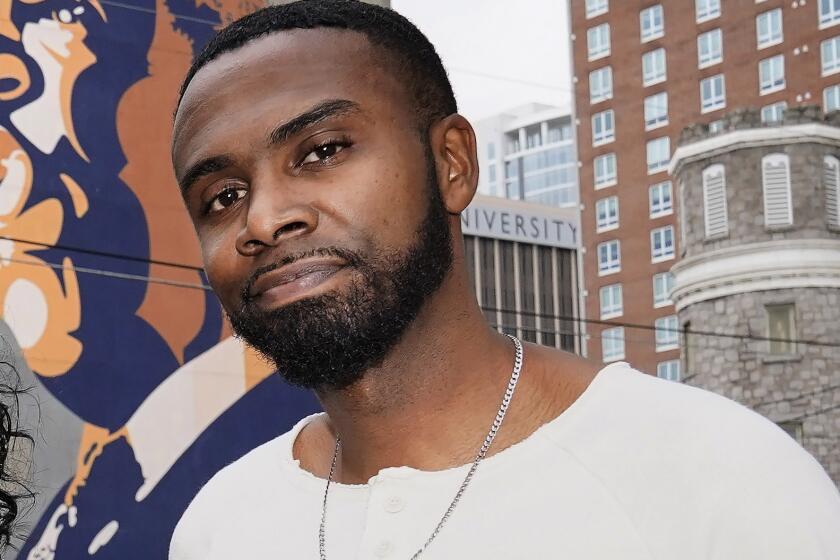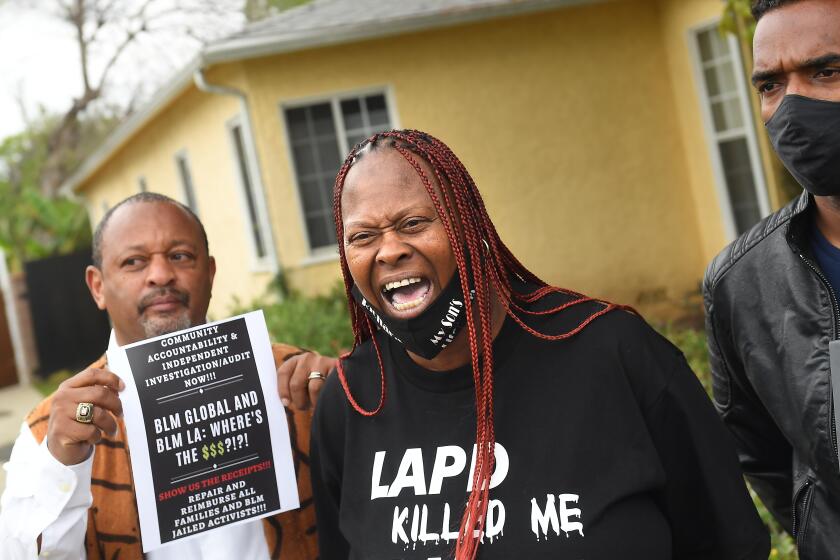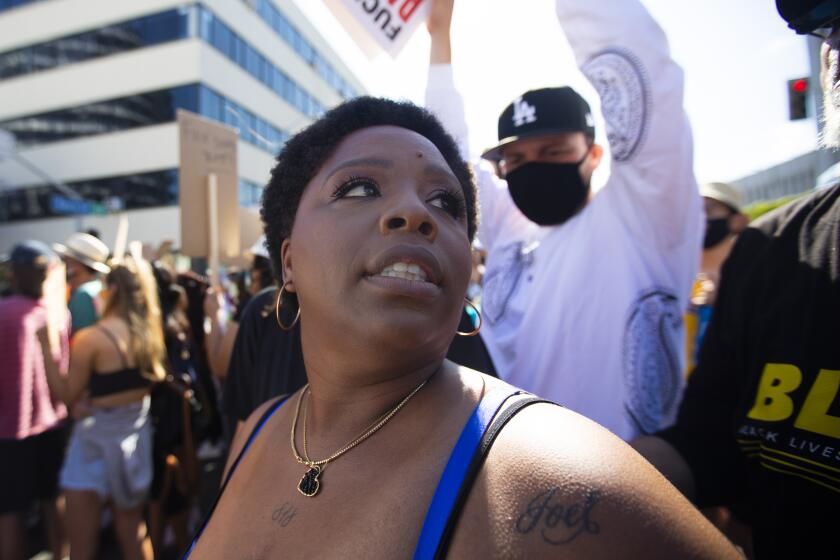Column: In this Black Lives Matter family feud, we’ll get transparency. But at what cost?
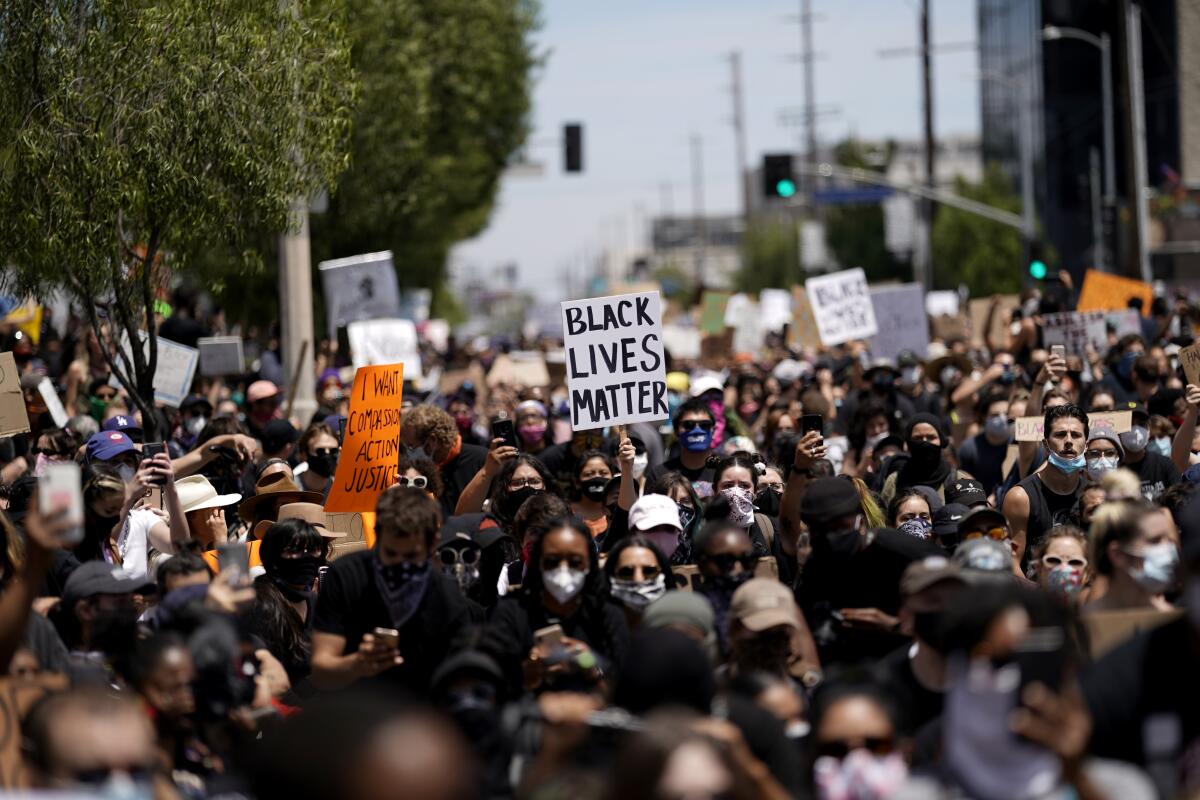
A few days ago, the venerable Pew Research Center released a report summing up the opinions of Black Americans, specifically our thoughts about racial inequality and the prospects for systemic social change.
It found, among other things, that 4 in 10 of us believe Black Lives Matter has done “the most to help Black people in recent years.”
Just 17% named the NAACP. An additional 13% chose Black churches. Just 6% picked the Congressional Black Caucus. And a mere 3% pointed to the National Urban League.
In fact, across all of the demographic subgroups Pew surveyed — the highly educated and the less educated, the rich and the poor, the left-leaning and the right-leaning, the registered and unregistered to vote — Black Lives Matter was their top choice.
This, of course, was before the implosion.
Shalomyah Bowers is called a ‘rogue administrator, a middle man turned usurper’ in a suit filed in L.A. County Superior Court. He denies all claims.
On Thursday, activists from the 26 official chapters of Black Lives Matter sued their sister nonprofit, Black Lives Matter Global Network Foundation, alleging mismanagement, self-dealing and general financial malfeasance.
The lawsuit, filed in Los Angeles County Superior Court, specifically names Shalomyah Bowers, an Oakland-based policy advocate and consultant who joined the board of directors of the Black Lives Matter Global Network Foundation earlier this year.
The chapters, organized under the umbrella organization Black Lives Matter Grassroots, allege that he was “a middle man turned usurper” who refused to abide by a transition plan to wind down the foundation and transfer its power back to the activists. Instead, they allege, he went “rogue” and helped steal more than $10 million in donations.
“While BLM leaders and movement workers were on the street risking their lives,” the lawsuit claims, “Mr. Bowers remained in his cushy offices devising a scheme of fraud and misrepresentation to break the implied-in-fact contract between donors and BLM.”
In a statement, Bowers and the rest of the three-person board called the accusations “slanderous and devoid of reality.”
“We should be focused on the work — the work of liberation and Black joy,” they wrote. “Instead, we face, yet again, another round of struggle for ‘control’ of one organization. This time, by people who say they love Black people and center abolitionist values but whose actions are furthest from movement principles of courageous conversations, reconciliation, and finding pathways for peace.”
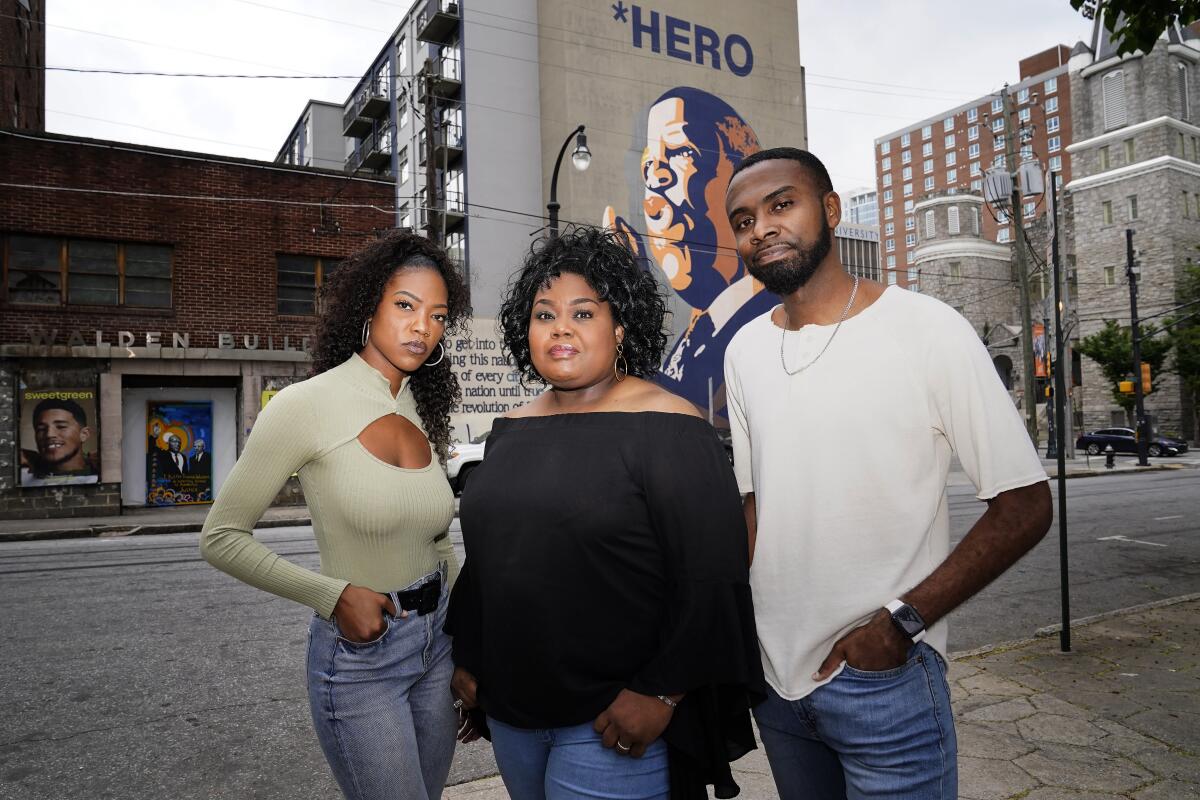
For many people — surely some of the 3,912 Black people surveyed by Pew — this family feud probably comes as something of a surprise. But the truth is that this has been brewing for months. Years even.
Let me break it down for you.
When Patrisse Cullors stepped down as executive director of the Black Lives Matter Global Network Foundation in 2021, she did so under a cloud of controversy. And it prompted a pivotal changing of the guard at the nonprofit.
Most people think of Black Lives Matter as a decentralized movement against police brutality and for racial justice. And it is — in many ways shepherded into existence by Cullors, who lives in Los Angeles, and fellow Californians Alicia Garza and Ayọ Tometi.
But BLM is also a nonprofit foundation registered with the Internal Revenue Service. It’s this legal entity that receives donations and distributes the money to activists working in the BLM Grassroots official chapters, of which L.A.’s is the first. (There also are dozens of unofficial chapters that aren’t connected to the foundation, but round out the broader BLM movement.)
It was only after George Floyd was murdered by Minneapolis police, launching a racial reckoning that pulled millions of Americans into the streets, that it became clear that Black Lives Matter, the foundation, was growing too big, too quickly.
Cullors was ill-prepared for the moment, she later admitted. The foundation didn’t have the staffing or the infrastructure to deal with the flood of $90 million in donations it received in 2020.
And once it became clear how much BLM had raised, it prompted a backlash, with Black activists demanding transparency. They wanted to know what had happened to the money, and why more of it hadn’t gone to its chapters and to the families of those slain by police.
Conversations that had been happening quietly — about how BLM should be structured and about who should be prioritized for donations — began to get louder and angrier.
Cullors repeatedly denied any wrongdoing. But reports that the foundation had paid $6 million for a property in Studio City didn’t help. Nor did allegations, floated without evidence by right-wing news outlets, that she had gone on an illegal “real estate buying binge” with millions of dollars in donations.
So she stepped down. And the widely respected Tides Foundation stepped in as a fiscal sponsor to help scale the BLM foundation to meet the needs of the moment, such as filing long-delayed financial paperwork with the IRS.
These changes were what led to the naming of a new board of directors — including Bowers — earlier this year with the hope of rebuilding public trust.
For years, activists have been questioning what Black Lives Matter does with the donations it gets. Those questions have turned to accusations.
Meanwhile, activists with the chapters of Black Lives Matter Grassroots, led by Black Lives Matter-L.A. founder Melina Abdullah, started holding news conferences.
Out came complaints that the foundation, under Bowers, had unfairly fundraised off the activists’ work, while also locking them out of Black Lives Matter’s social media accounts and excluding them from key decision-making.
The overall message was clear: BLM Grassroots is the real Black Lives Matter, made up of the people on the ground doing the work in communities. And the BLM Global Network Foundation, controlled by consultants, isn’t.
So I’m not surprised that this escalated into a very public lawsuit. In addition to damages, the chapters are seeking a restraining order to block the foundation from using BLM’s main social media accounts and website.
Abdullah called the decision to go public with the dispute a “very difficult and painful” one.
“We know that while we can go, ‘Well, it’s the Global Network Foundation,’ the world only understands ‘Black Lives Matter,’” she told me. “We know that this hurts the reputation of Black Lives Matter.”
Abdullah said BLM Grassroots had “tried settling things quietly,” requesting private meetings with the foundation and sending letters to Bowers. “It just didn’t work,” she insisted.
Perhaps a lawsuit was ultimately necessary, if only for the sake of transparency.
If there really has been financial malfeasance, particularly anything close to what’s described in this lawsuit, the public deserves to know the truth. Besides, questions have been circling for far too long — first about Cullors, and now about Bowers and apparently Abdullah.
BLM Grassroots claims that Bowers had been self-dealing, awarding grants to his own consulting firm and charging the foundation exorbitant fees.
“The lawsuit demands that they return the people’s funds and stop impersonating Black Lives Matter,” attorney Walter Mosley said in a statement.
The foundation’s board of directors denied the claims, and instead accused Abdullah of a similar scheme, citing a letter from unnamed members of Black Lives Matter Grassroots echoing the accusation.
Abdullah denied any wrongdoing. “I suspect there probably will be more hits,” she told me.
This is messy and ugly stuff.
And, as a Black woman, I hate to see it — especially as we approach the midterm elections, when the flexing of Black political power will be critical to hanging onto a Democratic majority in Congress.
Though mired in controversy, Patrisse Cullors’ stepping down is just the evolution of a grass-roots organization that’s no longer quite as grass-roots.
It’s hard to believe it was only two years ago that Black Lives Matter was an untainted force to be reckoned with. It was a movement that defined the political agendas and aspiring priorities of a new generation.
Back then in 2020, as the racial reckoning was unfolding, a “significant share” of Black Americans predicted that society’s sudden focus on inequality would lead to policy changes that would improve lives, according to Pew.
Now it seems we’re left with the old standbys: the NAACP. The Urban League. The Congressional Black Caucus. And Pew’s newer polls of Black Americans already suggest that a pessimism has crept in.
So, more than anything, I’m sad about what’s happening to Black Lives Matter. Sad that this is apparently the cost of transparency.
Abdullah says that BLM is “a really beautiful and powerful movement that has just fallen into the wrong hands.” We’re about to find out whether that’s true. But there will be no real winners in this family feud.
Black lives matter and always will. But I fear Black Lives Matter, the movement, will never matter as much as it once did.
More to Read
Sign up for Essential California
The most important California stories and recommendations in your inbox every morning.
You may occasionally receive promotional content from the Los Angeles Times.
